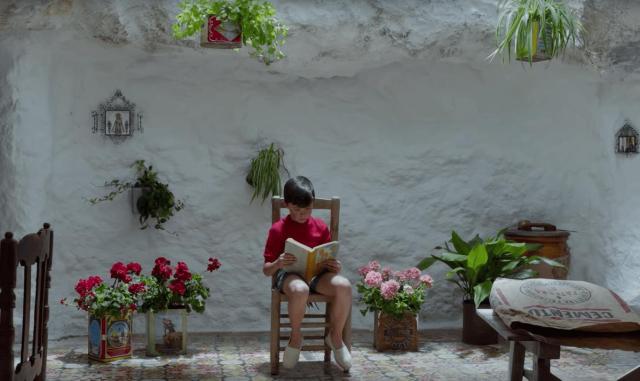
Antonio Banderas plays Salvador Mallo, a revered movie maker
This is one of those films that critics call a ‘personal’ work, meaning autobiographical. It contains scenes and relationships lifted from the filmmaker’s life woven into the story, some events are true, some fiction. I guess you could call it a study of his inner demons, in this case, a Spanish man beset by ailments and contradictions: an atheist with Catholic guilt, a creative man cocooned in his modish apartment, acquiring a heroin habit.
With few exceptions, novels in which the author has clearly placed his or her self as the central character risk our boredom. Film auteurs can avoid that pitfall because their craft is so visual. I can think of a few film directors who produced a film about making a film, showing us all the trials and tribulations that befall even the most experienced filmmaker, Truffauts Day for Night (1973) a famous example, but I can’t think of one so eager to bear their soul as Pedro Almodóvar.
One could call Almodóvar’s Pain and Glory his most nakedly personal film to date, but then being his 21st, and considering his achievements in the medium and his many awards, he’s quite entitled to draw on aspects of his life for a plot, so long as he doesn’t bore us to death in the telling.
With flashbacks to his childhood, this film tells us of Almodóvar’s days and dark nights as an aged man. As an obsessive writer and lapsed filmmaker myself, his study of self-doubt, writer’s block, severed career relationships and loneliness, struck a chord, but I wonder how many people spot the subtleties and will relate aspects to their own lives. The distributors think only a few, which is why the film is in art house cinemas.
In an age of American comic book cut-outs dominating the big screen, few filmmakers exist willing to probe the depths of love and intimacy and separation with the reckless openness of Almodóvar. And he is superb at writing fine roles for women.

Almodóvar as a young boy, played by Asier Flores
To aid visual plausibility, Almodóvar enlists the considerable thespian talents of Antonio Banderas to play him as the elder filmmaker, Salvador Mallo. Banderas is a very likeable actor, born in a small Andalusian village and by dint of hard work rising to Hollywood star, an example of what you can achieve from humble origins. (Milkman Tam Connery will attest to that.) He won Best Actor at Cannes for his interpretation of the role, and deserves greater recognition as a highly versatile actor.
Banderas has worked with Almodóvar on eight previous collaborations, and the second-co-actor Penélope Cruz six times. She plays Almodóvar’s mother when he was a child, forced by a work-shy father to live in basic conditions in a rural village. Her moments of concern for her only child mixed with her feelings of self-preservation ring true. For the movie anorak, Pain and Glory is Almodóvar’s second collaboration with both of them together, the first being I’m So Excited! (2013).
In this self-referential movie the director in the film is called ‘Salvador Mallo’ almost an anagram of Pedro Almodóvar, just so you are in no doubt who the story is about. In spite of playing the great, and here retired director in melancholy mood for most of the film’s length, Banderas gives a performance of tremendous subtlety. He manages to make interesting or humorous what could have been tedious repetitive motifs, and makes comical scenes in which Salvador dabbles in drugs.

Almodóvar (wearing shades) and his repertory company
It is not trite to state the obvious, Almodóvar is gay; hence the core of the film is about his earliest lover and partner. On seeing a play Salvador has written for lberto Crespo (Asier Etxeandia), performed by Crespo an actor Salvador had worked with in the past (Banderas?) leaving bad blood between them, but befriends again, the play catches the attention of an old lover, a muse who appears at his Salvador’s door. The discussion between them illustrates how time can remove passion if not affection. There are no scenes of gay sex beyond a lingering kiss on the mouth, a moment of real tenderness.
Scenes in the second half with his ailing, elder mother (Julieta Serrano), has Salvador desperate for affirmation that he is not a failure as a man or a son in her eyes. She never does more than offer a gentle stroking of his face, a situation familiar to those of us who yearned for parental affection. Those moments in her company and at dinner are low-key, fashioned without extraneous melodrama or antagonism.
Pain and Glory threatens to be smothered by its pain killer substance addiction subplot. I started to fret I was not going to see Salvador as a sober person, only introspective, self-pitying or manic. When he tells his doctor, “My life is meaningless without filming” – the addiction to drugs as addiction to work allegory, his excuse for his perpetual lachrymose state – I wished Almodóvar had cut back on those scenes and given us more of Salvador the entertaining companion, and Salvador the filmmaker on the set. However, extended scenes with the young Salvador, the relationship with his mother, are irresistible, both enjoying the sun on their face as they work and sing together.
The film is aesthetically pleasing thanks to the Spanish settings and the gorgeous cinematography of José Luis Alcaine. The euphoric music by Alberto Iglesias accentuates Banderas’s tics and meanderings as he – Salvador, discovers himself anew. The final scene, a film within a film, is the perfect ending.
Billed as the third film in a semi-autobiographical trilogy together with Law Of Desire (1987), and Bad Education (2004), Pain And Glory finds Almodóvar glancing back to look forward. I can’t think of a parallel to Pain and Glory in Scottish cinema other than the black and white trilogy: My Childhood (1972), My Ain Folk (1973), and My Way Home (1978) by Bill Douglas, all short films. Though visually unforgettable, like stills photography, Douglas’s three black and white 16mm films are unrelentingly bleak, whereas Almodóvar’s bleakest scenes are here full of vivid colour and light, as you’d expect of a film set in Spain.
Douglas’s trilogy was his first work, an exercise in minimalism. Pain and Glory comes to us in the autumn of Almodóvar’s career. Scotland is unable to sustain a filmmaker’s career to the extent of Almodóvar’s output unless he or she abandon’s the land of their birth to work abroad thus cutting themselves off from the people and the inspiration. Douglas made one other film before he died, a film about England’s Tolpuddle martyrs.
Whether or not Almodóvar himself was ever addicted to heroin is immaterial. Pain and Glory is an absorbing work, a film not burdened with a surfeit of navel-gazing. If we are to take most of what we see at face value, this personal essay celebrates the key loves of his life that inspired his illustrious career, and in that he has created a fascinated study of a writer-director, even though we are presented with a melancholy journey.
- Star Rating: Four stars
- Cast: Antonio Banderas, Leonardo Sbaraglia, Penélope Cruz
- Director: Pedro Amodóvar
- Writer: Pedro Amodóvar
- Cinematographer: José Luis Alcaine
- Composer: Alberto Inglesias
- Rating: 15
- Duration: 1 hour 53 minutes
- RATING CRITERIA
- 5 plus: potential classic, innovative. 5: outstanding. 4: Excellent. 3.5: excellent but flawed. 3: very good if formulaic. 2: straight to DVD. 1: Crap; why did they bother?

Good work Grousey.
An extremely well written and sensitive review of a beautiful film.
It´s on Netflix here in Spain so I assume it will feature on the same in the Uk and if it does don´t miss it.
One of Almodovar´s best.
I’ve a feeling it will appeal most to those of us in the autumn of our lives, as well as Almodovar fans. 🙂
Pingback: Pain and Glory: Movie Review